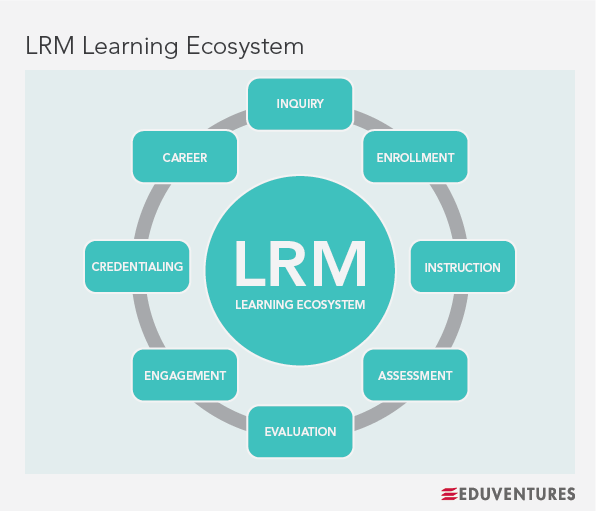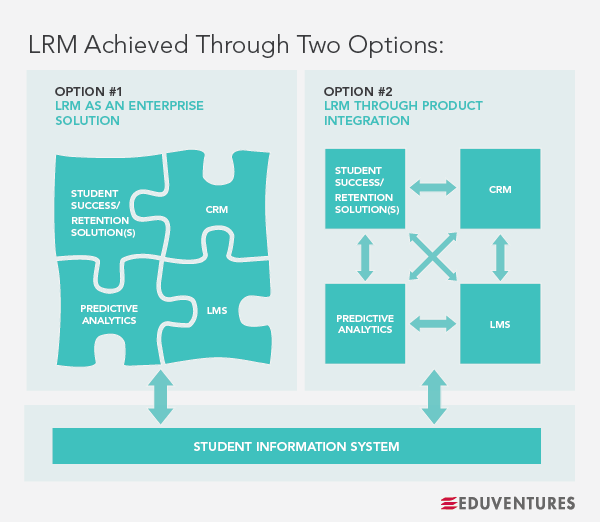The learning management system (LMS) market is approaching disruption from a small number of highly specialized companies with a product concept commonly referred to as learning relationship management (LRM). As part of Eduventures’ ongoing coverage of the evolving edtech landscape, we recently spoke with CEOs from three of the most prominent LRM players: Gunnar Counselman from Fidelis Education, Brian Peddle from Motivis Learning, and Terry Nealon from Fishtree. Here’s a snapshot of what we learned about this concept and its product play into the enterprise platform market.
 LRM also rests on the functionality you would expect from any truly disruptive vision: cloud architecture, mobile-readiness, cohesive interoperability, and a seamless integration of standards. Depending on an institution’s aperture for change, LRM can be achieved in one of two ways: through the migration of all learning platforms to a single LRM environment (Option #1, below), which essentially displaces the need for all other systems (with the exception of an SIS, which is usually still necessary), or through product integration (Option #2).
LRM also rests on the functionality you would expect from any truly disruptive vision: cloud architecture, mobile-readiness, cohesive interoperability, and a seamless integration of standards. Depending on an institution’s aperture for change, LRM can be achieved in one of two ways: through the migration of all learning platforms to a single LRM environment (Option #1, below), which essentially displaces the need for all other systems (with the exception of an SIS, which is usually still necessary), or through product integration (Option #2).

What is an LRM?
First off, LRM is a process that unites various tools and technologies to achieve the look, feel, and functionality of an LMS. This process combines learning modules and assessment features with other capabilities, namely a constituent relationship management platform (CRM), a student success or retention solution (or many solutions rolled up into one), and predictive analytics. This approach offers not only the utility of a central and scalable repository for learning, but also robust records management and an analytics engine capable of tracking individual learner progress, staging interventions when necessary, and mapping student progress to learning objectives and career outcomes. In other words, LRM offers a holistic student success solution that the education world has never before experienced. LRM also rests on the functionality you would expect from any truly disruptive vision: cloud architecture, mobile-readiness, cohesive interoperability, and a seamless integration of standards. Depending on an institution’s aperture for change, LRM can be achieved in one of two ways: through the migration of all learning platforms to a single LRM environment (Option #1, below), which essentially displaces the need for all other systems (with the exception of an SIS, which is usually still necessary), or through product integration (Option #2).
LRM also rests on the functionality you would expect from any truly disruptive vision: cloud architecture, mobile-readiness, cohesive interoperability, and a seamless integration of standards. Depending on an institution’s aperture for change, LRM can be achieved in one of two ways: through the migration of all learning platforms to a single LRM environment (Option #1, below), which essentially displaces the need for all other systems (with the exception of an SIS, which is usually still necessary), or through product integration (Option #2).

First Movers and Market Shapers
To date, Fidelis, Motivis, and Fishtree are the only three pure play companies active in the LRM market. This is not surprising given the novelty of their approach, but it is astonishing given the breadth of attention being paid nationally to the fundamental learning needs these products address (e.g., personalization or modularity). Each of these companies, while similar in their conceptual underpinnings and basic systems architecture, bring unique approaches to this concept.- Fidelis is the first true mover in this market. Its product is informed by the company’s history supporting non-traditional learners in a variety of environments, including (but not limited to) competency-based education (CBE). In terms of nuts and bolts, its core platform offers just about everything, from personalized learning plans and unlimited access to digital content to interactive student portfolios. The unique Fidelis badging platform, which is plugged into all major social networks, including LinkedIn, maps easily to industry competencies.
- Motivis brings a very similar approach, but focuses exclusively on CBE. Built on the back of Saleforce and principally for Southern New Hampshire University’s College for America (CfA) program (which is wholly competency-based), Motivis offers its clients personalized learning environments and a robust CRM interface that is used to enhance everyday business functions. For more radical approaches to CBE, such as direct assessment, this is not only a compelling, but also an essential alternative. Motivis also permits its clients to help drive its product roadmap, which is ideal for institutions in need of a platform that can be adapted to meet their own contextual needs. And of course, Motivis was fully incubated at CfA, so its design and support team is all in on the grassroots advancement of CBE.
- Fishtree is unique in that it does not aim to replace the LMS, but rather to enhance it as high powered middleware used, among other things, to enhance personalization through adaptive learning. Having recently moved into higher education from K-12, Fishtree also offers a unique focus on content discovery and curation. This content can then be quickly and easily mapped back to course objectives or competencies based on a proprietary algorithm, which even scores content based on its effectiveness and outcomes. Through its adaptive engine, Fishtree can be used to track student behaviors across very conventional and unconventional learning environments, meaning it can drastically enhance optimal learning outcomes for any number of program formats.

